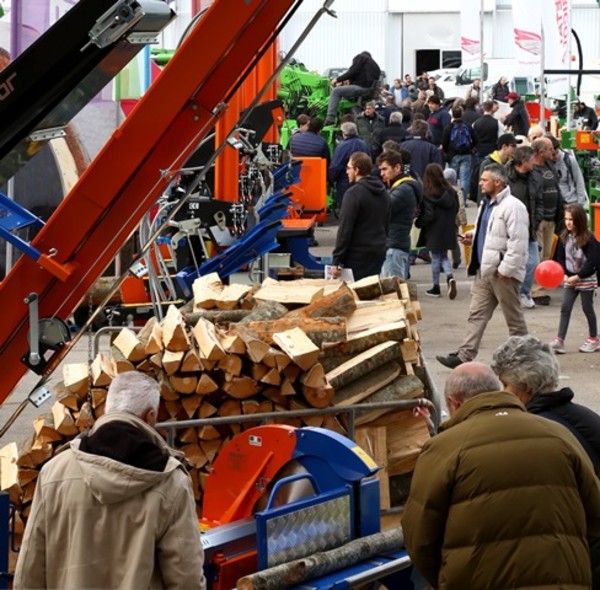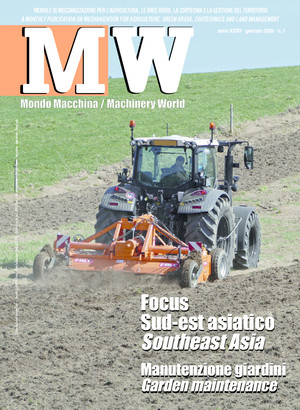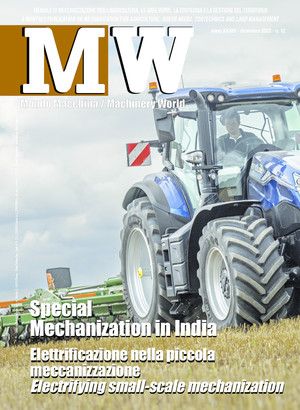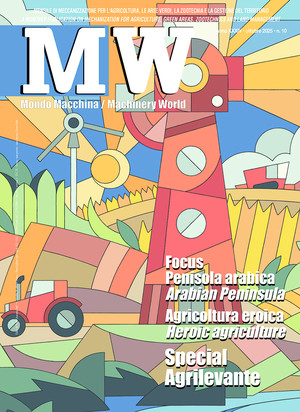
Biomass, a strong point for the circular economy
The residues left after agricultural and agro-industries operations work are sources for generating energy and these prospects are becoming more important. The development of this supply chain requires efficient and integrated mechanization as is emerging in the technologies exhibited in the EIMA Energy Salon and through the program of public meetings to enliven the spirit of the five days of the Bologna exposition
The recent turning point of the analysis of the International Energy Agency Renewables 2018 - Global Status Report clearly brought out the importance of having bioenergy in the future beginning in the five years from 2018 to 2023. There is talk of the analysis text on gigantic sources in the field of renewables in light of the multiple applications for, other than electricity production, thermal energy and bio-carburation for transport. According to forecasts it seems that there will be a substantial global increase of FER by some 250 Mtep to impact overall energy consumption up 12% by 2023 to reach 18% in 2040 and that the bioenergy increase will play an important key role by providing 76 Mtep equal to plus 30% for all the renewable sources. To make certain that this trend is respected there must be an explicit reference to a modern expression of bioenergy which - taking up the values of past experiences - exclusively advances fully sustainable models for raising the value of biomass. This must include mature and efficient technologies and a supply chain well integrated with the territory. Pursuing the objective will require adequate political support. For bringing biomass to the center of attention as a renewable but in inexhaustible resources for bioenergy will be truly modern when a correct balance can be achieved with other productive sectors which draw on the same raw materials. We are referring to sectors of great importance, other than food, involving the ample bioeconomy sphere such as green chemistry, biobuilding, nutrition, cosmetics and the like. With this approach, the giant of modern bioenergy will acquire an even more important scale unable to escape a vision of a development strategy which extends beyond the sphere of energy to arrive in the vast context of the circular economy. A grasp of the dimensions of the phenomenon it will not be possible to refer to a hidden giant but to a sleeping giant it would be good to arouse by first clarifying the regulations to apply to best practices. Considering all this, the EIMA Energy salon will be set up in Bologna for the EIMA International with an area for presenting the projects created throughout Europe and internationally for a correct way to raise the value of biomass, either from residues or specific agricultural crops. The importance for a scientific point of view for dealing with these issues led ITABIA, the Italian Biomass Association, to bring together a number of prestigious agencies and national research centers, including ENEA, CNR and CREA as well as many universities reporting the results of experiments involved the biomass issue for innovative mechanization, sustainable dedicated agriculture crops and enhancing the value of residues and bio-refineries.
EIMA Energy schedule
wednesday november 7
Workshop 1 – Innovations in the Agrarian Sector and Forestry for Sustainable Energy
Quintetto Hall. Pavilion 36 ( 15.00 pm – 17.00 pm)
The Agrarian and Forestry Sciences Department (DAFNE) of the University of Tuscia in Viterbo is developing various research activities targeted on excellent title: Sustainability for the Agrarian and Forestry Sectors in the Mediterranean Region Associated with Global Warming SAFE MED for research in sustainability in various agro-forestry sectors associated with energy as the objective to aim for.
Thursday November 8
Workshop 2 – The AGRICARE Project: How Conservation Agriculture is Becoming Innovative
EIMA Hall WEB TV. Centro Servizi (9.30 am – 10.45 am)
The Life “AGRICARE” (Enea) Project. Veneto Agricoltura and Maschio Gaspardo have demonstrated how integrating precision and conservation agriculture can provide a significant result for reducing greenhouse gas and increase organic substances and prevent degradation phenomena.
Workshop 3 – Fake News a Ballast for Innovation
Quintetto Hall. Pavilion 36 (12.00 pm– 13.00 pm)
In collaboration with the New Energy publisher, FederUnacoma and Itabia have opened an information campaign for reporting how fake news can damage the work of many valid initiatives in the bioenergy sector driven by the NIMBY syndrome. A number of examples will be discussed.
Workshop 4 – Green Chemistry for Sustainable Vegetable/Fruit Crops
Quintetto Hall. Pavilion 36 (15.00 pm – 5.30 pm)
The CREA Policy and Bioeconomy Center is promoting a coordinated focus on specific solutions which can allow Green Chemistry to deal with principal problems in the vegetable/fruit supply chain.
The purpose of the seminar is to report the first results of the work involving research representatives and institutes from around the world in profitable discussions.
Friday November 9
Workshop 5 – Agricultural residues: From Wastes to Precious resources for Industry and Bioproducts
Quintetto Hall. Pavilion 36 (10.00 am – 1.00 pm)
The H2020 ENABLING PROJECT Enhance New Approaches in Biobased Local Innovation Networks for Growth has the objective of stimulating the market of bioproducts by facilitating contact between agricultural biomass products and the transforming industries. The seminar has the purpose of involging figures of interest.
Workshop 6 – Innovative Mechanization With Low Environmental Impact
Quintetto Hall. Pavilion 36 (2.00 pm– 3.00 pm)
Industries taking part in a dynamic exhibition of the dynamics of machines in operation (North Area near Pavilion 30). Workshop speakers will handle the issue of innovations for mechanization under the profile of sustainable development and bring up examples of models exhibited at the trade fair.
Workshop 7 – “Partnership Industrial Project in Costa Rica”
Quintetto Hall. Pavilion 36 (3.00 pm – 4.00pm)
For the Partnership Industrial Project in Costa he Ministry of Economic Development, the ICE Agency and CREA have completed mechanical systems for removing and raising the value of large quantities of pineapple residues to help the defense against Hippobosca equina, the blood-feeding fly.
Saturday november 10
Workshop 8 - Non-Food Crops for the Circular Bioeconomy
Gavotta Hall. Pavilion 33-34 (9.30 am– 1.00 pm)
The H2020 PANACEA Project directs attention to the most non-food crops to develop the bioeconomy for Italy’s circular approach. The workshop will take up a number of crops, camilla, thistle, milk thistle, hemp and linen, defined as multipurpose crops to use for diversifying the various components of the plants.








